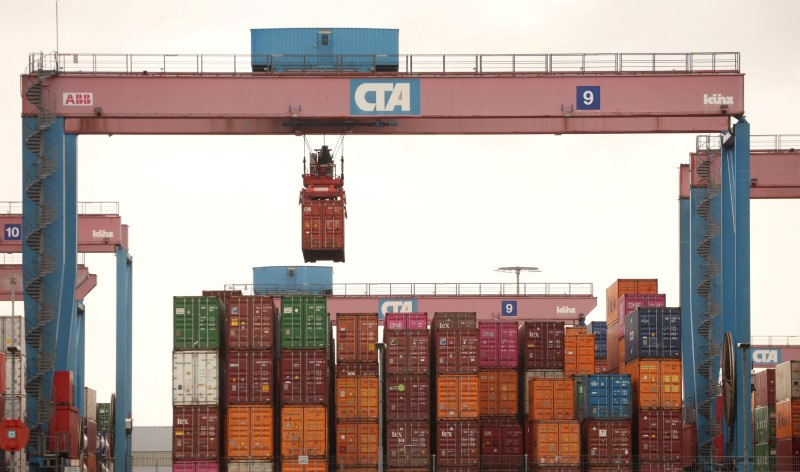By Maria Martinez
BERLIN (Reuters) -German exports fell more than expected in December due to weak global demand, data from the federal statistics office showed on Monday, underlining concerns about the health of Europe's biggest economy that may be slipping back into recession.
Germany's ailing economy had a bumpy start to the year with exports sinking, farmers launching nationwide protests, train drivers striking for days and heated debates among coalition partners on how to foster economic growth.
"These are recessionary numbers, consistent with overall difficult economic conditions in the German economy," said Claus Vistesen, chief eurozone economist at Pantheon Macroeconomics.
Exports fell by 4.6% in December compared with the previous month. The result compared with a forecast 2.0% decrease in a Reuters poll.
Exports to EU countries fell by 5.5% compared with the previous month, while exports to countries outside the EU declined by 3.5%, the office said.
Imports fell by 6.7% from November, the federal statistics office reported, versus analysts' expectations for a 1.5% decline.
The foreign trade balance showed a calendar- and seasonally adjusted surplus of 22.2 billion euros ($23.92 billion) in December, versus a surplus of 20.8 billion euros the previous month.
Germany's trade surplus in goods climbed further at the end of 2023, adding to the evidence that net exports were a significant help to GDP growth in the fourth quarter, "even if it did little to prevent an overall fall in economic output", said Vistesen.
RECESSION WARNING
Gross domestic product contracted by 0.3% in the fourth quarter compared to the previous quarter, prompting economists to warn of another recession.
The sickly state of the German economy is the next big challenge for the export-reliant countries of central Europe.
Close trade ties with Germany and its once-mighty auto sector were for years a boon for the region since the collapse of communism. But now those ties risk becoming a drag on the economies of Hungary, Czech Republic and Slovakia.
The German economy is once again lagging behind international growth this year, the OECD said on Monday, halving its forecast for 2024 to 0.3% GDP growth, while France, Italy and Spain are expected to perform significantly better.
"This is mainly due to the fact that energy-intensive industry has a greater weight in the German economy than in other eurozone countries," said OECD expert Isabell Koske, adding Germany was also more dependent on Russian energy imports.
With a slowdown in Germany weighing on the broader euro area, the shared currency bloc's outlook had worsened since November, with its economy now expected pick up from 0.5% last year to only to 0.6% this year, down from 0.9% previously.
In 2023, German exports were down 1.4% compared with 2022, while imports to Germany experienced a much sharper decline of 9.7%.
"The global economy is too weak to provide any momentum," said Alexander Krueger, chief economist at Hauck Aufhaeuser Lampe.
SENTIMENT HIT
Sentiment in the German export industry has clouded over and most industries still expect exports to decline in the coming months. The Ifo export expectations index fell to minus 8.4 points in January from minus 7.1 points in December.
"The German export economy is off to a worse start in the new year," said Klaus Wohlrabe, head of surveys at Ifo. "Exporters need fresh momentum."
Sentiment among small and mid-sized businesses in Germany, hard-hit by massive cost increases, weak demand and high interest rates, continued to deteriorate at the start of the new year, according to the KfW-Ifo SME Barometer on Friday.
Morale among the "Mittelstand" companies that form the backbone of the German economy fell in January, reflecting the uncertainty in the euro zone's largest economy, said KfW's chief economist Fritzi Koehler-Geib.
The weakness in global demand is also taking its toll in manufacturing.
In January, 36.9% of manufacturing companies reported a lack of orders, up from 36.0% in October, according to Ifo's surveys.
The situation is not better in the services sector. Business activity in the German services sector declined in January for the fourth consecutive month due to weakness in demand, a survey showed on Monday.
The HCOB final services Purchasing Managers' Index (PMI) fell to 47.7 in January from 49.3 in December, pointing to a faster contraction in activity.

The economic slowdown in Germany is also evidenced by the downbeat assessment in Vodafone (LON:VOD)'s trading statement.
Vodafone said service revenue growth in Germany slowed sharply to 0.3% in the third quarter, three months after its biggest market returned to growth. ($1 = 0.9280 euros)